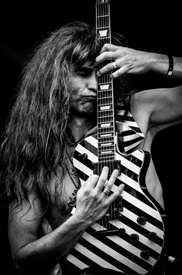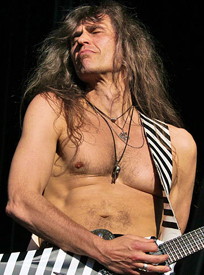|
Interview conducted June 07 2017 Interview published July 11 2017 |
![]()
"…the big thing is to do something that sounds like Grave Digger, but is a little different."
The German heavy metal force Grave Digger went northbound to play Sweden Rock earlier this summer and Metal Covenant therefore took the opportunity to speak to the band's guitarist Axel Ritt.
![]()
Tobbe: Healed By Metal was released in January and I think it absolutely follows the Grave Digger vein, the traditional Grave Digger type of heavy metal, so is it important to you to make albums where the fans know what will come out of it?
Axel: Well, half and half. You know, the main thing is: Grave Digger got a big tradition and a big history, so we always wanna give the people what they want. So it doesn't make sense to do something completely different. Grave Digger tried once or twice, especially in the early days, and it was a disaster era.
So I think we gave up on trying to give the people what they don't want or on trying to convince them with some new stuff. But if you always do the same thing, for example doing Excalibur or Rebellion [The Clans Are Marching] 10 times, it's even more embarrassing. So we're always living on the edge by keeping the history and keeping the tradition and doing some new small parts on every album.
But in the end, you know, when Chris [Boltendahl] opens his mouth everybody knows it's Grave Digger, yeah. That's a big trademark we luckily have. But in the end the compositions go always a little step further, but it has to be Grave Digger of course.
Tobbe: But wouldn't it be just fun nowadays to do something a little bit different for yourself personally?
Axel: You see, all of the artists get different songs in their brain when they're writing, you know what I mean? So most of the colleagues in the band, and me as well, got some other bands we're playing with. Maybe a cover band, like Jens [Becker, bass] is doing with Bon Scott, an AC/DC cover band.
And I do have my old project, Domain, which is on hold, but maybe next year I'm gonna work on a new album and I got this, let's call it fun band, Monstergroove. It's a heavy rock trio, but we play only funk and soul classics of the 70's in baritone tuning. Songs, all so different and easy and it's just fun. So if you wanna do something new and something different you have to do it in a different band. It doesn't make sense to bend the Grave Digger style. I say "Give the people what they want!" and the people always want that kind of songs.
Tobbe: But aren't you a little bit concerned about coming out with the same kind of riffs a little bit too often and get too similar in the end, even though people like what you do?
Axel: Of course it is a problem and the big thing is to do something that sounds like Grave Digger, but is a little different. Not too much, but it has to be different enough so it's a new song. So you have to keep the trademark and put something new around it, but just not too far away from the history, you know. You see, all the bands… Ask Angus Young, or ask the guys from HammerFall, or even Iron Maiden. All the big bands who got a special trademark or whatever are always swinging around their hot spot. They all got the same problems, but they all know to never do something unexpected. [Laughs]
 Tobbe:
Yeah, because when bands change too much… Listen to Metallica's St.
Anger [2003]; it was, like, a catastrophe.
Tobbe:
Yeah, because when bands change too much… Listen to Metallica's St.
Anger [2003]; it was, like, a catastrophe.
Axel: Yeah, that was a catastrophe, in all directions. But in this range, the biggest band or one of the biggest bands in the world in metal, then of course you can do whatever you want and even St. Anger went multi-platinum or whatever. Although it's crap the whole way through it's very successful. We would be happy if we got sales numbers like that of course. If they do 5 or 10 albums in that direction, then maybe the hardest hardcore fan would say no. But you have to do a lot of crap for many years before the fans turn their back on you.
Tobbe: What do you think that Grave Digger has that kind of separates you from all the other bands that's out there?
Axel: The main thing is of course Chris' voice. It's the biggest trademark and it's something we always have to put in front. He's selling the songs, you know. And there are some other parts in the compositions which are totally typical for Grave Digger, like the staccato guitar riffs in verses for example. And, of course, we're Germans and we have this German metal aspect in our compositions, which most of the old bands have, like Accept and Scorpions as well. It's a combination of chords, melodies and lyrics and if you put it all together it's the Grave Digger trademark.
Tobbe: Do you try to put some extra effort into your choruses to bring out a strong chorus that people can sing along to?
Axel: Yup. That's one of the main things. If you break it down you can say that good Grave Digger songs, or the better ones, got always two things and that's a very strong main guitar riff, that we call the main riff, and a big sing-along chorus which everybody knows or understands after listening to it once. Not twice; Once! That was one of the parts that took a lot of our energy, or effort, on the last album Healed By Metal, where I sat together with Chris and said "Chris. We need the riff and we need the chorus." and these were the first two parts we always composed and then we were putting the rest around these two parts.
 Tobbe:
You guys have very much experience in recording albums and when you go
into the studio nowadays, does it sometimes become like a routine job
or are you all excited all the time to bring out the best?
Tobbe:
You guys have very much experience in recording albums and when you go
into the studio nowadays, does it sometimes become like a routine job
or are you all excited all the time to bring out the best?
Axel: Let's say we have a car mechanic and he's building a new engine. He will of course say "I've built so many engines and an engine is always an engine.", but every new engine is a little different and you've got more horsepower or less horsepower, or whatever, you know what I mean? And it's the same for doing an album. Of course it's craftsmanship; it's working with the hands and it's somewhat like a regular job. But putting it together, because of the different songs, is always different.
Tobbe: Grave Digger puts out albums kind of often, compared to a lot of other bands of your generation, so what keeps your creativity going?
Axel: We got these 2-year intervals. We got one album every second year and in the other year we're doing a lot of touring, like the festivals for example. So we think two years is a good interval for keeping people with us and not doing too much so that the people say "I didn't hear the album from last year and they already got a new one.". In my eyes it would be a mistake to wait 5 years for an album, then you're gone!
Or maybe not if you're a very big artist who can tour 4 years in full houses with sold-out shows and so, like Kiss or whatever. Yeah, the big names. They don't need any albums anymore because nobody wants to hear them. No matter how good or bad those albums are, everybody wants to listen to Detroit Rock City of course and nobody gives a fuck about the new one, you know. Sad but true, but of course they can wait for years to do a new album.
Tobbe: Do you guys ever think about why you haven't become bigger than you actually are? You're a well-known band and has always been, so how come you can't take that final step to, like, fame, if you know what I mean?
Axel: Well, our main trademark is also our main brake to become mainstream; it's Chris' voice. If you take 100 people and 50 of them said that he has a horrible voice and 50 percent said that it's the best voice that they have ever heard, it's still 100 that are talking about it, but only the 50 of them who like it will buy the album and it doesn't make sense to do some more mainstream and some more kind of melodic singing, because then it's not Grave Digger.
But on the other hand we are always on a good middle range and we can live on music and most of our colleagues can't say that. So it's a privilege and I'm very happy that we got this trademark. We probably could have been bigger, but then it has to be different. Grave Digger tried once to become mainstream, with the Digger album, you know, yeah? [Stronger Than Ever, 1986] It was a total flop, although I don't think that all those songs are that bad as some people say. If you're a die-hard true metal fan then of course.
Some of the parts of the 80's stuff they tried are not that bad and I have asked Chris many times to put one or two of those songs in the setlist, but he says "Never! Never!". It was so horrible in those days. When they entered the stage the people tore the sleeves apart and threw them on stage and turned their back to the band. It must have been horrible, so he doesn't wanna go back to those days, you know.
Tobbe: So why is your keyboard player always dressed as the Reaper?
Axel: Until Tunes Of War [1996], Grave Digger did only the typical metal stuff, so it was drums, guitar, bass and vocals; that's it! From Tunes Of War and on some of the keyboard parts became stronger or more important and there was also some choir stuff. So the question was how to put this on stage without having a keyboard player. They had a part where they put just a simple keyboard player dressed like a normal musician on stage and it was totally boring. So they said "What's our main thing or visual trademark?" and "It's the Reaper, so let's dress him up as the Reaper.". And it was a big success, visually, so they kept this thing going.
Tobbe: What kind of legacy, in the heavy metal world, will Grave Digger be able to leave one day?
Axel: [Breathes out]… I think you should ask the fans that, because they decide who will build a legacy and who will be a small name or a big name, whatever. I think you will always hear immediately which band is playing and I think that is a big gift and that's the main thing we try to keep. And when the band is gone, maybe we will be part of this legacy. I think we're on a good middle range and I think it's fine. That's good, and a lot more than I expected.
![]() See
also: review
of the album Healed By Metal
See
also: review
of the album Healed By Metal
Related links:
www.grave-digger.de
www.facebook.com/gravediggerofficial
![]()